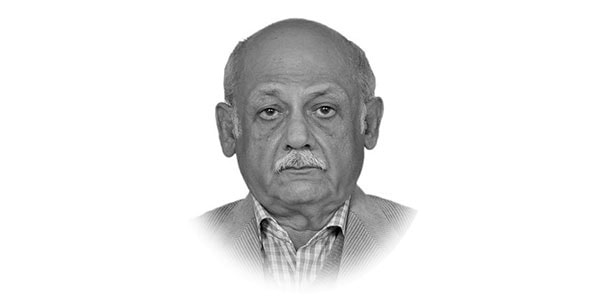Consequences of PTI slow march
AFTER the successful vote of no confidence against him Imran Khan is on the rampage. The present long march or rather slow march starting from Lahore is the second attempt after May 25 to besiege the federal capital and dictate his own terms.
Previously the Federal Govt. was in firm control of Punjab but this time the situation is totally different.
Imran Khan’s allies are now in control of the most important and powerful province of Pakistan and it will not be easy for the PDM coalition to control the rampaging fully charged mobs led by Imran Khan.
At this point in time it is not a power struggle between Imran Khan and the ruling coalition but it has now become a clear confrontation between Imran Khan and the powerful military establishment.
In an unusual and surprising presser the DG ISI and the DG ISPR had some scathing and toxic remarks about the proponent of the Utopian dream of Riasat-i-Madina and their protégé of the recent past.
The recent alarming and controversial utterances of the former Prime Minister and his fanatic minions has sent shock-waves throughout the length and breadth of the country.
The press conference of Faisal Wavda, a close confidant of Imran Khan sent a chilling message to all the stakeholders of the country.
In a tweet on Monday, on the fourth day of the ‘Haqeeqi Azadi March’, the Kaptaan wrote: “The sea of people along our March on the GT Road. For 6 months I have been witnessing a revolution taking over the country.
Only question is will it be a soft one through the ballot box or a destructive one through bloodshed?
” The ‘revolutionary leader’ also asserted that he would be the first to sacrifice his life for the cause of radical change.
This is perhaps for the first time in our political history that a leading politician and a former Prime Minister is openly threatening bloodshed and carnage if his demands are not met by the government of the day.
Two leading lights of the PTI namely the Kamran Bangash and Ali Amin Gandapur have also issued rather provocative and alarming statements.
Imran Khan Followers are now possibly trying to prove themselves more loyal to the throne than the king himself.
It is also true that it is not only the PTI that can be blamed for political tension; the Federal Interior Minister also passed some highly objectionable comments, hinting at using force against the protesters.
All these terrible threats and statements by both sides is adding fuel to the raging fires of political tension and instability in the country.
On the receiving end are the common citizens of Pakistan wondering about the final consequences of the current political situation.
History is a witness that all such situations in the past have dragged this country into chaos and crisis and has invited non-democratic forces to wrap up the democratic system and place the country under a dictatorship and this has happened four times in the past.
The first Martial law in Pakistan was imposed in Lahore in 1953 after the mayhem and chaos caused by the anti-Ahmedi Movement.
This political crisis managed to destabilize the incumbent government divided the society on religious lines and proved to be the catalyst for the military dictatorship of General Ayub Khan in 1958.
This reign lasted ten years and dismantled the fabric of democracy in the country. In the decade of the 1970 the alliance of political parties against the government of ZA Bhutto called the Pakistan National Alliance ushered in the rule of General Zia Ul Haque who ruled for eleven years and empowered the religious extremists and obscurantist forces in the country.
The brief civilian supremacy that the country gained during the few years of the decade has become a distant reality now.
The agitation not only dealt a severe blow to the economy but also sowed the seeds of sectarianism while also promoting an unfortunate culture of religious bigotry that has been tearing down the social fabric of the country since then.
The aim and objective of the slow march of Imran Khan appears to be a show of strength and to pressurize the military establishment to accept the terms being dictated by Imran Khan but there is no sign that the Establishment is in any mood to bow down before the will of Khan and his followers.
If anything is clear it is that the chasm of differences between the establishment and their last blue eyed boy is too wide to be bridged.
The statements given out by Imran Khan these days indicate that he is least bothered about the future of democracy in Pakistan.
Just a few days back we saw him say that if any undemocratic move is attempted as a result of his march then it would be the rulers and not he who should bear responsibility for that unfortunate phenomenon.
The slow march of Imran Khan will not topple the present government and inviting the army to intervene will have very serious consequences for the country.
—The writer is Professor of History, based in Islamabad.










